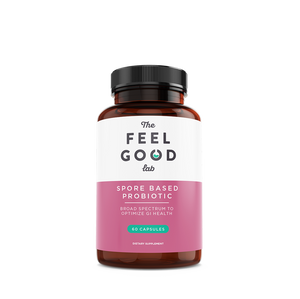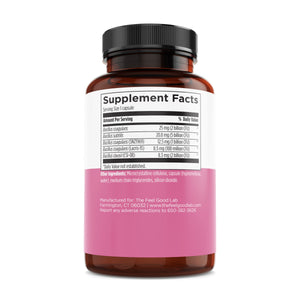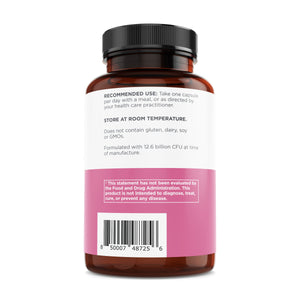Your Cart is Empty



Spore Based Probiotic is a broad-spectrum formula taken once a day to optimize gastrointestinal health. 5 different strains of bacteria that produce a multitude of enzymes, secratory proteins, antimicrobial compounds, vitamins and carotenoids, all so you can feel good.
Recommended Use:Take 1 capsule with a meal or as directed by your healthcare practitioner. 60 capsules | 2 month supply.
Replacing healthy bacteria in the GI tract can be challenging, especially when you think about how far supplements have to travel to get to the correct area in the gut. That's where Spore Based Probiotics come in.
What differentiates Spore Based Probiotics is their presence of an exterior spore coat, which makes them acid tolerant andresistant to many other reactive chemicals in the digestive tract. This means they have a greater survival rate through the stomach's harsh environment and as a result, more viable probiotic is able to reach the distal gut where it works it's magic. In addition, Spore Based are also resistant to antibiotics, and while you may not be taking them purposefully, they are so prevalent in our food supply that they are seriously impacting our gut.
Plus, because they are more resistant to temperature, you don't need to refrigerate Spore Based Probiotics in order for them to stay fresh.
Spore Based Probiotic may support gastrointestinal health, promote regularity and improve microbial balance for the following individuals*
When functioning properly, the intestinal wall acts as a selective barrier, permitting certain substances to enter the body (e.g. digested food particles) while excluding toxins and harmful bacteria.
According to the NIH, Leaky Gut allows the entry of harmful microorganisms, toxins or undigested food particles through the junctions of the intestinal wall, reaching the bloodstream and being able to affect the hormonal, immune, nervous, respiratory, or reproductive systems. This can cause tissue damage and chronic inflammation.
Leaky Gut is on the rise in Western countries due to diets high in sucrose, refined carbohydrates, genetically modified gluten, and other food additives and pesticides.
Common symptoms may include:
Our Food Inflammation Test (132 & 176 pannels) includes 8 key markers to determine gut function and permeability
Probiotics may support*
GI Tract Repair
Gut Wall Lining
Beneficial Bacteria
Immune Function
Spore Based Probiotic may support*
GI Tract Repair
Proper Digestion
Gut Wall Lining
Beneficial Bacteria
Immune Function
Specialy formulated with 5 unique Bacillus probiotics to support your body from the inside out.
With over 10 Billion CFU of beneficial bacteria, our Spore Based strains mean that they can withstand the harsh envronment of the gut that can comprimose traditional probiotics.
No refridgeration needed.
Specialy formulated with 5 unique Bacillus probiotics to support your body from the inside out.
With over 10 Billion CFU of beneficial bacteria, our Spore Based strains mean that they can withstand the harsh envronment of the gut that can comprimose traditional probiotics.
No refridgeration needed.
All of our products are backed by research, tested for purity and use only the highest quality ingredients. That's why they are trusted by thousands of practitioners.
Microbiome balance is critical to our health. Our Spore Based Formula is made up of some of the most studies strains of healthy bacteria to help improve the gut microbiota and overall health.
Our gut is the gateway to our health, but it's under attack in today's society. Spore Based Probiotics can help bring our GI tract back into balance, improve digestion, reduce bloating and support the immune system.*
"I have been diagnosed with leaky gut by my doctor, and Spore Based Probiotics were a staple in my healing protocol. Along with L-Glutamine and cleaning up my diet (bye bye Gluten), I have seen an incredible improvement in how I feel and even saw improvements in my gut barrier markers during my last checkup"
Donald D.
May 1, 2024
"These probiotics were recomended by my naturopath and it has been a wonderful digestive aid. It's worked very well for my gut issues and I love that I can travel with it because it doesn't need to be refrigerated"
Carol F.
April 30, 2023
"This Spore Based Probiotic is worth every penny! I've noticed a huge difference in my digestive system with improved regularity, less bloating and more energy. I highly recommend this product to anyone looking to improve their digestion and overall health."
Jen S.
Dec 5 2023
Save up to 33% when you bundle 3 or more products together.